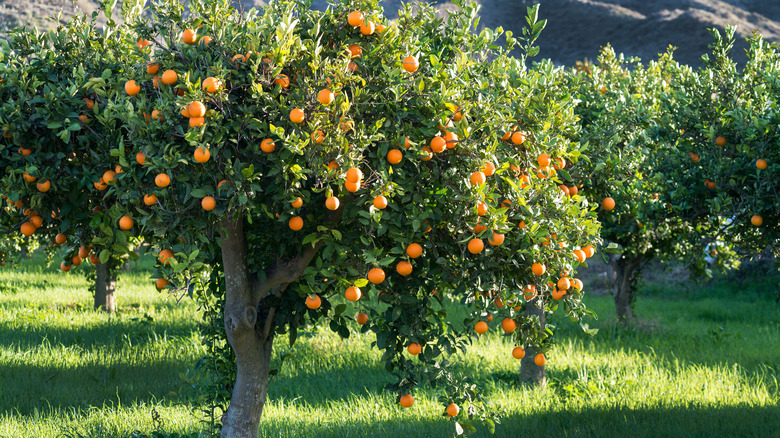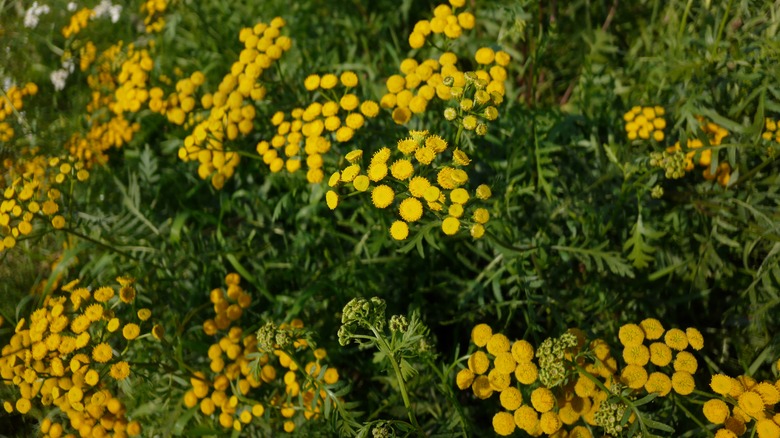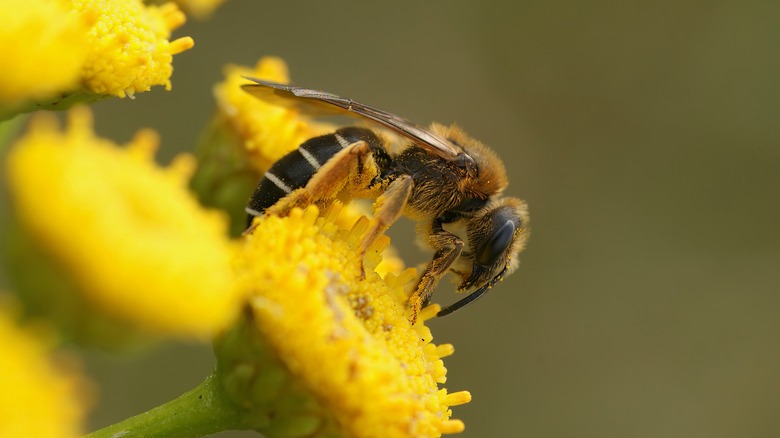Grow This Bright Flower Under Your Orange Tree To Help It Thrive
One of the many benefits of gardening is having readily available fruits and vegetables right in your backyard. Orange trees (Citrus sinensis) offer amazing harvests, with mature trees providing hundreds of fruit each season. The availability of fresh fruit is only half the appeal; they make excellent focal points with their glossy green foliage, colorful fruit, and pretty white blossoms. To make them look even more eye-catching, there's a bright yellow flower that not only adds even more visual interest but provides benefits to your orange tree. Tansy (Tanacetum vulgare) is a perennial clumping plant that grows fern-like foliage with small yellow button-shaped blooms. It emits a strong scent, which is part of the reason this gorgeous flowering plant keeps ants away from your home and garden.
Although common tansy has several benefits, especially when grown next to orange trees, it's important to note that it's considered to be invasive in some areas. So, make sure it's permitted in your region before growing it. Even if you're able to grow it where you live, you'll need to control the spread. Mow before seed production or remove the entirety of new plants that pop up. Because they spread from underground rhizomes as well as seeds, you'll need to routinely destroy new sprouts that pop up. However, the bit of extra effort may be worth it for the benefits it provides your orange tree. Let's get into why orange trees and tansy make ideal companion plants.
Orange trees and tansies can live in similar conditions
If you already know how to grow and care for an orange tree, then caring for tansy will be relatively easy. Oranges are the official state fruit in Florida, where you can plant these fruit-bearing trees any time of the year. Native to Asia, orange trees thrive in tropical climates with warm weather and moderate humidity. However, you can plant them in most regions in spring or summer once the risk of frost has passed. Tansy, on the other hand, can withstand a bit more cold and can even survive the winter if given protection.
As the most famous Sunshine State plant, it's no surprise that orange trees thrive when given lots of sun: at least six hours of direct sunlight daily. Similarly, tansy does well in full or partial sun. However, tansy likes a little afternoon shade in high-temperature climates, which orange trees are happy to provide. Typically, an inch of weekly water from either watering or rain is enough to keep established orange trees happy. Tansy is quite drought-tolerant and doesn't require as many showers. Orange trees thrive in acidic to neutral soil, while tansy can tolerate nearly any pH level. However, both must be in well-drained soil to avoid waterlogging.
How tansies and orange trees benefit each other
Growing plants that thrive in the same conditions together makes your gardening tasks much simpler. However, companion planting benefits your garden in more ways than one, and tansy has a lot to offer orange trees. Like many fruit-bearing trees, orange trees are prone to attracting harmful insects like scale, mites, aphids, and more. Thankfully, tansy does the opposite, deterring several pests with its strong smell. There are some bugs that are magnets to tansy, like parasitic wasps and tachinid flies. While this may seem like a downside, the wasps and flies aren't harmful to your plants but are known to eat pests like hungry caterpillars. The bright yellow blooms also bring in pollinators like butterflies, bees, and hummingbirds to your yard.
As if the natural pest control these flowers provide isn't a huge enough benefit, tansy may also help with the fruiting of your trees. Adding tansy beneath your orange tree can help improve the flavor of your fruit. Additionally, this companion plant may even help your tree bear even more fruits. Tansy accumulates potassium in the soil, which is one of the most vital nutrients required to grow citrus trees. Soil rich in potassium will also help your tree produce bigger oranges, healthier leaves, and achieve overall better growth. That said, you'll still need to apply fertilizer specially formulated for citrus trees for the best possible health of your plant.


